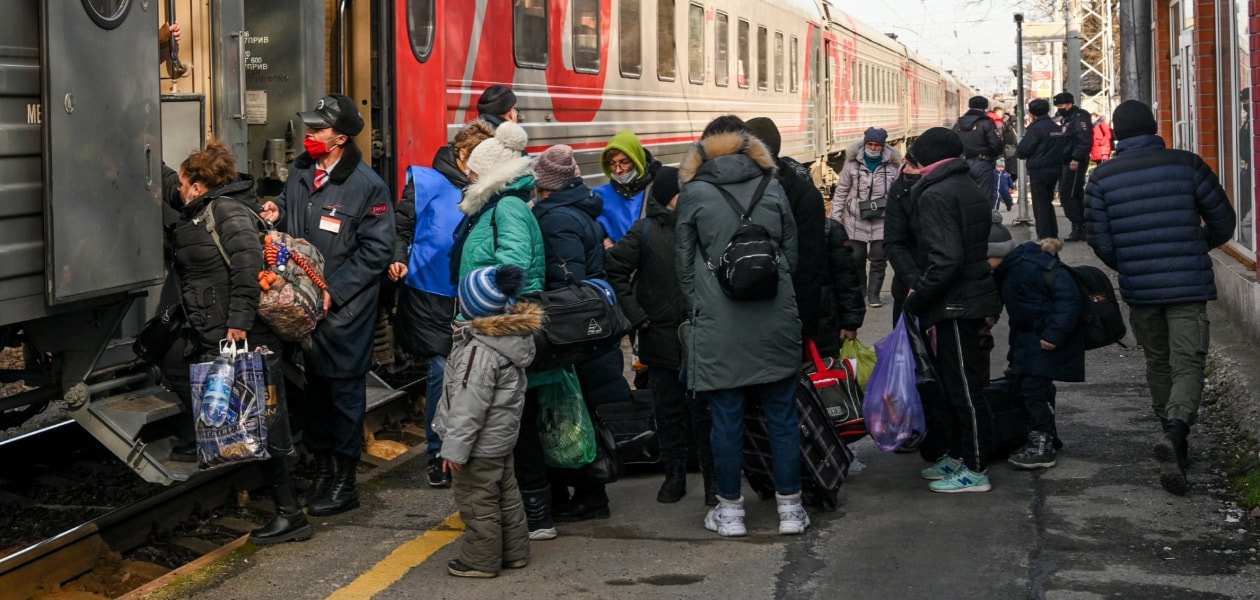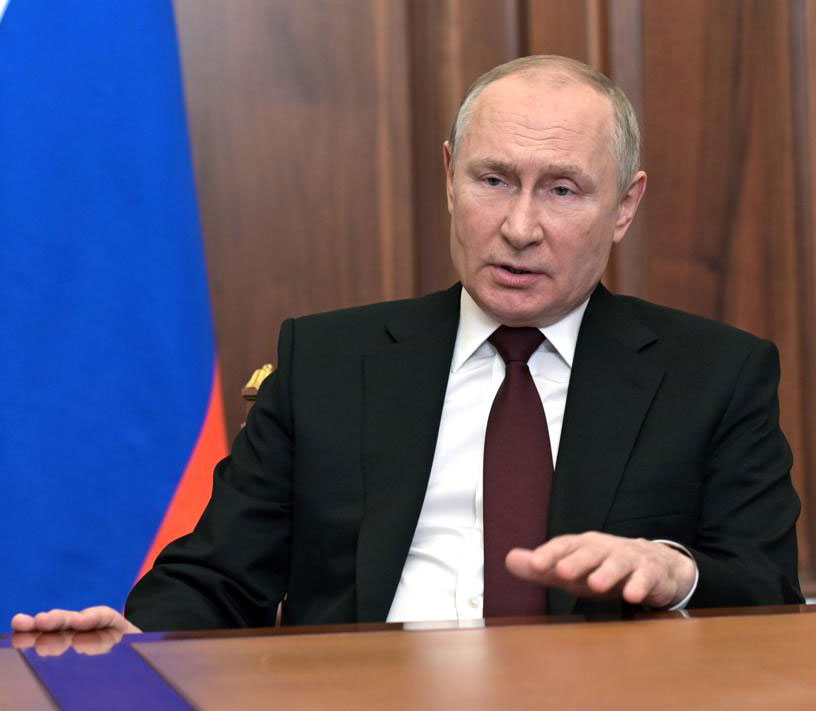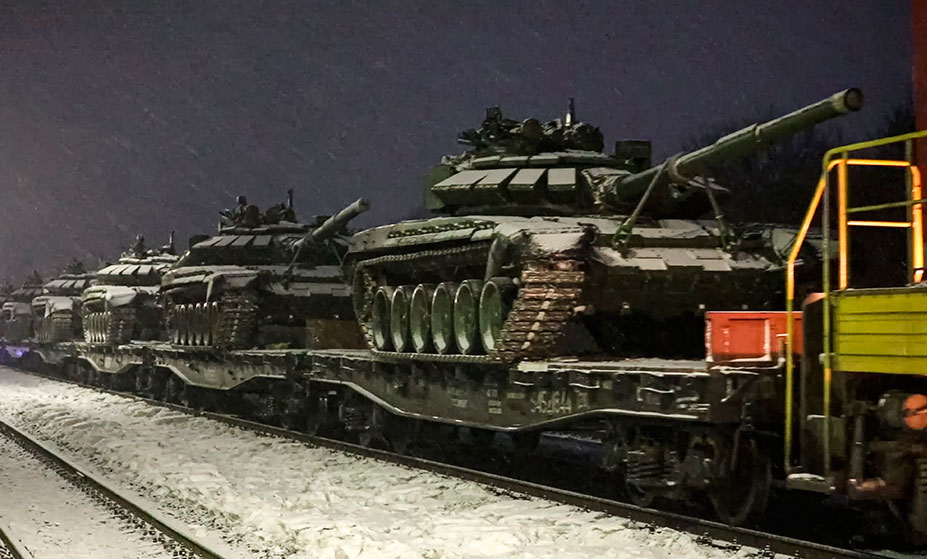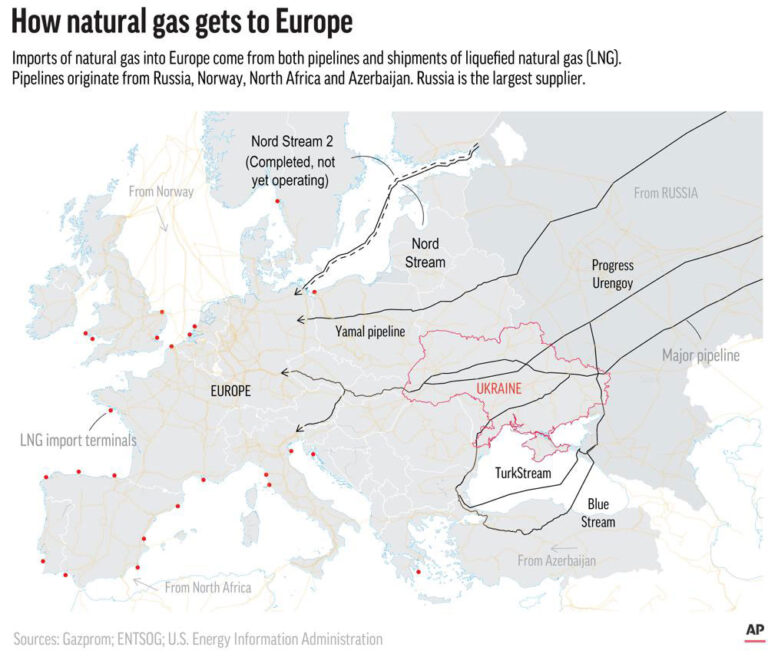|
People from the Donetsk People's Republic, the territory controlled by a pro-Russia separatist government in eastern Ukraine, board a train to Russia after evacuating in the Rostov-on-Don region, near the border with Ukraine, Russia, on Sunday, Feb. 20, 2022. They were fleeing shelling by the Ukrainian Army. | AP The big news regarding the Russia-Ukraine conflict over the President’s Day holiday was that Russia’s President Vladimir Putin ordered troops to enter two separatist regions of Ukraine for “peacekeeping” purposes. There has been no confirmation yet that Russian troops, in addition to those that may or may not have already been in those regions, have actually moved into the areas yet.
Although cable networks carried parts of Putin’s speech on Monday, none carried the entirety of his remarks, which were a mix of nationalist territorial claims, revisionist history, and legitimate charges of Ukrainian hostility in the Donbass. The press gave heavy attention to his provocative claim that Ukraine lacked “real statehood,” a position seen as justification for a potential Russian absorption of the country. The media provided little to no analysis of the details of Putin’s assertion, however. In his speech, Putin laid out his own version of the history of Russian-Ukrainian relations, putting blame on Communist leaders of the Soviet era for upsetting “the historical destiny of Russia and its peoples” by focusing on the “right of nations to self-determination” in the years after the Bolshevik Revolution of 1917. “Lenin’s principles of state development were not just a mistake,” Putin said, “they were worse than a mistake.” He said these principles, along with subsequent shifting of the internal territorial boundaries of the USSR by other leaders, led to what he implied were artificial divisions between Russians and Ukrainians. Putin said that governing such a vast territory as a “confederation,” as was the case in the Soviet period, was “far removed from reality” and the “tradition…of the Russian Empire.” With the spotlight on Putin’s comments concerning territory and statehood issues, few U.S. media outlets provided much attention to his charge that the government in Kiev had organized “a terrorist underground movement” in the Donbass region and Crimea. Nor was note taken of the plans of Ukraine’s government, according to its own strategists, to execute a war “with foreign military support” against Russia and the breakaway regions in eastern Ukraine. President Joe Biden, waiting barely a minute after Putin finished speaking, announced sanctions against the two republics of Lugansk and Donetsk. He is expected to announce new severe sanctions against Russia shortly. It should be clear that even though they don’t involve “troops on the ground,” sanctions are, themselves, also an act of war. Russia has been living with a variety of painful sanctions imposed by the U.S. for eight years now already. The raising of the stakes and the raising of tensions resulting from Putin’s announcement ordering in “peacekeepers” Monday are, at least in part, a predictable result of NATO, the U.S., and Ukraine ignoring a number of legitimate security issues repeatedly mentioned by Russia for the last 30 years, including and especially Russia’s objection to the eastward expansion of NATO and the placement of offensive weapons on Russia’s borders.
They also ignored French President Emmanuel Macron’s suggestion of a “Finlandization” solution for Ukraine whereby Ukraine, like Finland during the Cold War, selects its own form of government and remains independent while it pursues a nonaligned neutral foreign policy with no offensive weapons stationed on its soil and aimed at Russia. Another unfortunate result of where all of this leaves us is that, unless all sides pull back from the brink and negotiate seriously, we already have an unwanted winner in this war. The winner is the multi-national fossil fuel industries based in the U.S. The CEOs must have been rubbing their palms together with glee when they heard Biden warn Americans they will have to pay higher prices for energy as the U.S. imposes sanctions on Russia. Futures for gasoline and home heating oil were already up on Monday and Tuesday. Those companies hate the fact that Russia has been supplying Europe’s energy needs. They want to sell Europe their gas, fracked in the U.S., even though that gas will be far more expensive for Europe than the Russian gas.
Americans, meanwhile, will be expected to pay more to help offset the costs to Europeans of an obscene profit-making machine operated by the fuel monopolies—a machine that has no concern whatsoever for Ukrainians, Russians, or Americans. The other winners of this war, of course, are the arms and munitions companies who drive up the U.S. military budget and take money from the social programs urgently needed at home. In the most serious crisis to envelop Europe since the Cold War, NATO has proven, once again, that it cannot meet the security needs of Europe and that a new security framework for the continent is sorely needed. An organization that takes in all of Europe, including Russia, on an equal basis, would be a sane and sensible way to go. AuthorJohn Wojcik is Editor-in-Chief of People's World. He joined the staff as Labor Editor in May 2007 after working as a union meat cutter in northern New Jersey. There, he served as a shop steward, as a member of a UFCW contract negotiating committee, and as an activist in the union's campaign to win public support for Wal-Mart workers. In the 1970s and '80s he was a political action reporter for the Daily World, this newspaper's predecessor, and was active in electoral politics in Brooklyn, New York. This article was produced by People's World. Archives February 2022
1 Comment
Charles Brown
2/23/2022 09:25:52 am
Russ Bellant , author of
Reply
Leave a Reply. |
Details
Archives
July 2024
Categories
All
|




 RSS Feed
RSS Feed